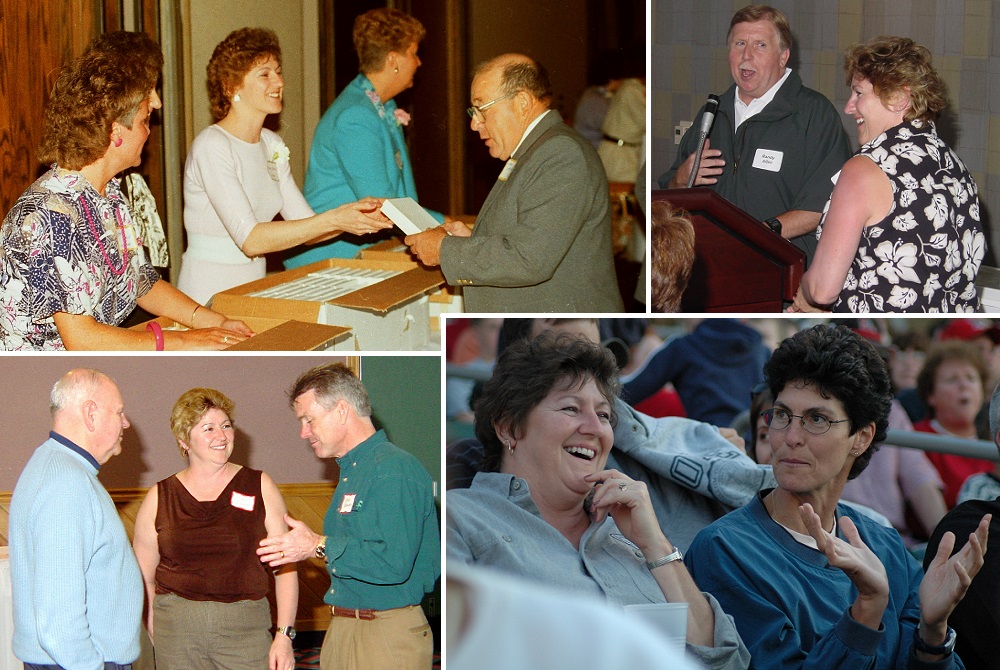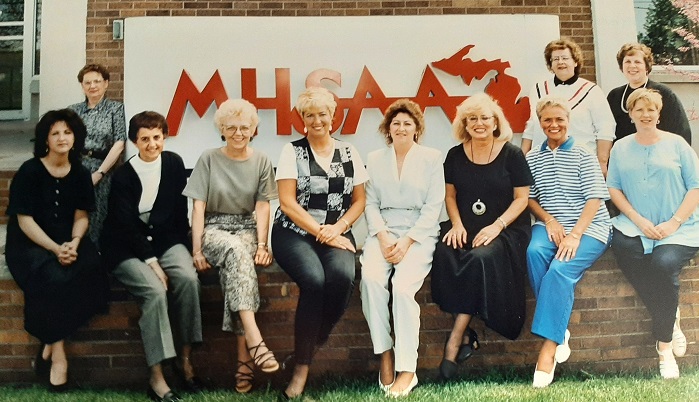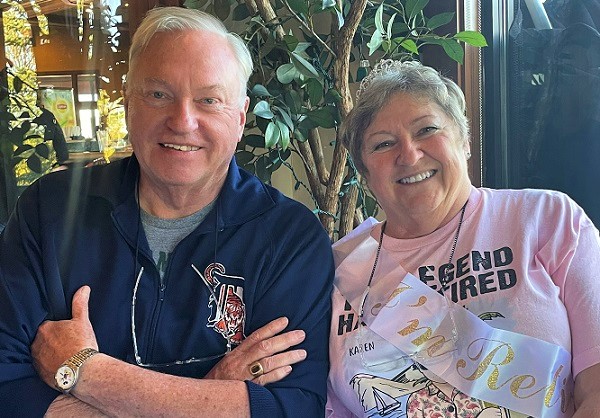
Rep Council Wrap-Up: Winter 2018
March 28, 2018
By Geoff Kimmerly
Second Half editor
With a number of important topics filling the agenda for its Spring Meeting this May, the Representative Council of the Michigan High School Athletic Association prepared for a number of possible votes by receiving and requesting additional information during its annual Winter Meeting on March 23 in East Lansing.
The Winter Meeting frequently serves as an opportunity for the Council to discuss items expected to come up for action at its final meeting of the school year, scheduled for May 6-7. Since June of 2017, the MHSAA has been pushing several projects forward – with work on the transfer rule and junior high/middle school sports receiving the most emphasis.
Addressing the chronically troubling nature of transfers in school sports, the MHSAA has facilitated nine months of discussions with leagues and administrative groups across the state to develop a proposal that would make the transfer rule sport-specific – that is, a rule that bases current eligibility on the sports an athlete has participated in in the past. The proposed new rule would make transferring students ineligible at a new school in the sports they played the previous year at their old school. However, transfer students would be immediately eligible in any sport they didn’t participate in the previous school year. A list of exceptions, including a change of residence, would still allow for transferring students to become eligible in all sports.
The Council discussed how support for this potential transfer rule change has grown, and suggested the MHSAA send further explanation of the proposal to school superintendents and principals before the meeting in May.
“Since last summer, there has been membership-wide discussion of proposals that pursue the elusive goal of adopting a transfer rule that is simpler and easier to understand and, therefore, more consistently enforced,” MHSAA Executive Director John E. “Jack” Roberts said. “There appears to be broad consensus that we are on the right path.
“If adopted by the Council in May, the full effect of the changes would not be felt until the 2019-20 school year. What sports are actually played by a student during 2018-19 would determine that student’s eligibility after a transfer for 2019-20.”
The Council also is continuing work on a number of efforts related to the MHSAA’s growing presence at the junior high and middle school level. Under consideration is a proposal increasing the number of contests permitted within the maximum 13-week seasons for several sports, and another proposal relaxing or eliminating the Limited Team Membership regulation for most sports at that level. The Council also is considering expanding the MHSAA’s role as a presenting sponsor at events involving junior high/middle school students.
MHSAA membership at the junior high/middle school level has increased by more than 100 schools – nearly 14 percent – and nearly 70 percent of 800 member junior high/middle schools have begun accommodating 6th-graders in their programs since the MHSAA’s Constitution was amended in 2015 to allow 6th-graders to be included.
“The emphasis on policies and programs related to 6th-, 7th- and 8th-graders is essential if sports at the high school level will remain relevant to students and useful to schools which are trying to engage youth in 21st-century learning,” Roberts said. “We’ve also put many policies under a microscope to see if they can be modified to respond to our customers’ desires for more competition at the 6th- through 8th-grade levels while remaining faithful to our mission of providing these younger student-athletes the opportunity to sample sports and develop new interests and skills.”
A number of other topics were discussed during the Winter Meeting in advance of actions that could take place in May or at the Council’s Fall Meeting in December:
• The Council is considering two leading options for setting the girls and boys basketball regular-season and MHSAA tournament schedules after the 2018-19 season. For 2018-19, for the first time, the boys and girls seasons will flip start and end dates, with the boys starting and ending their season first. This will be done to adjust to the availability of Michigan State University’s Breslin Center to host the boys Semifinals and Finals. For 2018-19, no other arena available is large enough to accommodate the crowd that traditionally attends the final games of the boys postseason.
One option for 2019-20 and possibly beyond includes continuing the current strategy of using multiple sites for Semifinals and Finals weekends while accommodating Breslin (or another largest arena’s) availability – for example, this year’s Boys Semifinals and Finals were played at Breslin, while the Girls Semifinals and Finals were played at Calvin College’s Van Noord Arena because Breslin was not available for the girls weekend. (Breslin and Van Noord will be used for the 2019 Semifinals and Finals weekends as well, again to accommodate Breslin’s availability.) The second option would put the girls and boys tournament schedules over the same three-week period and use the largest available arena to host games on only two days; Semifinals would be played at various sites for both genders, with all four girls and boys championship games played at the largest arena during one weekend.
• Also in girls and boys basketball, the Council will consider possibilities for seeding the top two teams in geographically-determined Districts. MHSAA staff have created plans for possible implementation as requested by the Council at its May 2017 meeting.
• In football, the Council is considering options to assist 8-player football schools with their regular-season scheduling.
“While transfers and junior high/middle school programs are fundamentally more important than single sport issues, we have an eye on several that will generate significant interest,” Roberts said. “Schools which sponsor 8-player football will be receiving plans to assist their scheduling of regular-season games, and they will be asked to provide reactions through an online survey during April.
“Basketball continues to have two issues which have more public interest than genuine importance. One – the boys and girls tournament schedule and championship venue after 2019 – is moving toward a vote in December. The other – limited seeding of boys and girls District tournaments – is scheduled for action in May.”
The Council also talked about ways of involving more junior high/middle school students and at more grade levels, and what possible new high school sports might draw students with a wider variety of interests and abilities. There also was discussion on how eligibility and transfer rules are applied to boarding school students and what modifications would promote competitive equity between boarding schools and both public and nonpublic schools.
The Representative Council is the legislative body of the MHSAA. All but five members are elected by member schools. Four members are appointed by the Council to facilitate representation of females and minorities, and the 19th position is occupied by the Superintendent of Public Instruction or designee.
The MHSAA is a private, not-for-profit corporation of voluntary membership by more than 1,500 public and private senior high schools and junior high/middle schools which exists to develop common rules for athletic eligibility and competition. No government funds or tax dollars support the MHSAA, which was the first such association nationally to not accept membership dues or tournament entry fees from schools. Member schools which enforce these rules are permitted to participate in MHSAA tournaments, which attract more than 1.4 million spectators each year.

Jackson's Imprint on MHSAA Stretches 45 Years, Across 4 Executive Directors
By
Geoff Kimmerly
MHSAA.com senior editor
October 5, 2022
First impressions can be significant, as many a saying goes. And Karen Brown unknowingly provided one in 1978 that helped affect the course of athletics in this state over the next 40-plus years.
A Michigan State University student named Karen Leinaar had shown up at the Michigan High School Athletic Association for a meeting about a 5K road race she was planning that was unrelated to the MHSAA except that the building provided a good meeting place – and Brown, just a year out of high school, was the first person to greet her at the old Trowbridge Road headquarters.
Seeing someone her age immediately made Leinaar more comfortable. She ended up returning to that office several times over the years, registering as an MHSAA game official while still an MSU student and then starting a career in 1982 that has included nearly 40 years as a high school athletic director and two decades of shaping policy as part of the MHSAA Representative Council.
That’s the kind of impact that’s emanated from Karen Jackson, formerly Brown, and over the last 45 years as assistant to four of the five executive directors during the MHSAA’s 98-year history. Jackson finished that run with her retirement Friday.
“She was always one that would welcome you, and whether you walked into the office or called on the phone, she always had an answer that would calm you down or provide you with the information you needed,” said Leinaar, who currently is serving as interim athletic director at Frankfort High School in addition to her duties as executive director of the Michigan Interscholastic Athletic Administrators Association.
“I remember initially calling and needing something from Mr. Norris – it was always Mr. Norris – and she could answer the question,” Leinaar added, referring to retired MHSAA executive director Vern Norris, who served in that role from 1978-86. “You didn’t want to talk to scary Mr. Norris – Vern was a wonderful man, but he was like the superintendent or principal. Karen always had the answer. … It was always that smile that made you feel like you were more than welcomed, wanted in the office, and everything is going to be OK.”
 Jackson began at the MHSAA in June 1977, two days before her graduation from long ago-closed Harry Hill High School in Lansing.
Jackson began at the MHSAA in June 1977, two days before her graduation from long ago-closed Harry Hill High School in Lansing.
Her high school sports career amounted to about half a season on the Hill varsity volleyball team as a sophomore before she had to switch gears to begin working for the Lansing Regional Chamber of Commerce as part of a school co-op program.
Jackson graduated as a co-valedictorian of Hill’s Class of 1977. Despite her academic standing, she hadn’t received much guidance at school on the possibility of college. But she had a job offer from the Chamber – and also had heard from grade-school friend Deborah Norris (Vern’s daughter) about an opening at the MHSAA.
The MHSAA was offering more money, and Jackson was hoping to buy a car – and so at 18, she became the secretary for executive director Allen W. Bush.
The title has changed over the years, from secretary to the executive director, to executive assistant, to senior executive assistant. The MHSAA’s administrative processes obviously have changed, mostly because of technology, from everything done on paper and through the mail to just about everything conducted digitally over the internet.
But many of Jackson’s most important duties at the end of her tenure resembled those she was hired to carry out nearly half a century ago.
Setting Exemplary Expectations
Bush retired a year after Jackson began, and she then assisted Norris for his eight as executive director. She served with Jack Roberts through his 32 years as executive director from 1986-2018 and then for these first 3½ under current director Mark Uyl.
She was considered the “baby” of the MHSAA staff during her first 12 years, until she turned 30 and her support staff teammates declared she wasn’t the baby anymore during a Christmas party serenade. Just about 33 years later, she’s leaving as one of two people left who worked in the old offices before the MHSAA moved to another East Lansing headquarters at Ramblewood Drive in 1996.
School sports happen thanks to a Karen Jackson or two in every community -- people who provide the unseen support that makes these programs possible every day.
For the last 45 years, she’s provided a consistent anchor for service to 1,500 schools and millions of student-athletes across Michigan.
 “She’s shaped so much of what we’ve done,” said MHSAA assistant director Kathy Vruggink Westdorp, who joined the staff during the 2003-04 school year after more than two decades working for Grand Rapids-area schools. “Her service to schools was imperative to what she was doing, and it was a valuable part for our membership. Hers was such a dedicated service, such an exemplary service – finding solutions, to do what’s needed.”
“She’s shaped so much of what we’ve done,” said MHSAA assistant director Kathy Vruggink Westdorp, who joined the staff during the 2003-04 school year after more than two decades working for Grand Rapids-area schools. “Her service to schools was imperative to what she was doing, and it was a valuable part for our membership. Hers was such a dedicated service, such an exemplary service – finding solutions, to do what’s needed.”
There are file cabinets and libraries and hard drives at the MHSAA office, the contents of which are known by only a handful of people on Earth – and Jackson perhaps the most as she did most of the sorting and maintaining of those files over the years.
For a 1996 Lansing State Journal feature on the MHSAA’s support staff, Jackson (then Yonkers) explained “there are always new challenges, new issues and controversies. It never gets boring. In the past 19 years, we’ve slowly shifted from dealing with athletic administrators, principals and superintendents to dealing with legislators, attorneys and courts.”
The last 25 years has seen much of the work swing back to providing service directly to schools. And Jackson’s mind has become part MHSAA library and part card catalog of where to find those few snippets she might not recall immediately from the last half century.
“I guess what I’m proud of is being able to find things, to know where to find things and how to find things that other people don’t,” Jackson said. “Yes, the technology has changed everything. … We used to have more schools – they used to have 40-some Detroit public schools – and there was a whole era of (litigation), but it’s calmed down now.
“I liked what I did, and it kept me on my toes – that’s for sure.”
The MHSAA is rooted in its responsibilities as a championship and eligibility rules maker, and Jackson was involved in just about every communication in those areas during her time. Tournament changes are made at Representative Council meetings, and she’s reported the minutes for at least 150 of those, including piles of special sessions as the MHSAA managed sports through the COVID-19 pandemic. Eligibility waivers are requested at Executive Committee meetings, and she’s prepared somewhere north of 505 sets of minutes for those monthly sessions even as those agendas have grown in content substantially over the years.
Then there’s all of the correspondence from those four executive directors – all with the initials “kb” or “kj” to go with “AWB” or “VLN” or “JER” and “MU.” She also was in charge of MHSAA election ballots for 35 years, served as the lead organizer of cooperative programs, helped with football tickets for a time and briefly was part of the program-selling crew at early Football Finals at the Pontiac Silverdome.
“I think I’m pretty lucky, being on the Council and Executive Committee, that I’ve been able to work with her a lot. And most athletic directors, they may not even know who she is because they may not have contact with her or do anything with her – but she’s obviously been the unsung hero of that office,” said Vic Michaels, who serves as director of physical education & athletics for the Archdiocese of Detroit and has served on the Representative Council since 2003.
“She just does so much that you don’t really know about, especially with the Council. Whenever I need anything, Karen’s the one I call. She is the history, really. She’s the keeper of that.”
Unprecedented & 'Never to be Replicated'
A longtime co-worker of Jackson, Shirley Hytinen, retired in 1998 after just a few months more than 43 years. She too had worked for four executive directors, as she began in 1955 during the Charles E. Forsythe era.
Jackson surpassed Hytinen’s tenure a few years into Uyl’s, and can readily recall some of what stood out from all four directors she’s assisted.
Bush was “really stern” – he had served in the U.S. Marines – and she said he didn’t smile much until the day he announced his retirement, when it was “like a switch turned. He was smiling and happy and joking around.”
Norris was “the sweetest guy in the world.” Jackson had bought her first house in her mid-20s and was preparing to move in with only her dad and his motor home to assist, when Norris showed up to help at 7:30 a.m. that morning to provide another set of hands.
Roberts is known by Michigan administrators and national colleagues for his writing, and Jackson said jokingly she still “cringes” when she sees a yellow legal pad. She was an important proofreader and spent the majority of her career serving with her desk just a few paces away from that of the recent National Federation Hall of Fame selection, and she attended his induction this past summer and San Antonio.
 Roberts pointed out that during the 1980s, the MHSAA would conduct nine Executive Committee meetings, each averaging fewer than 10 requests for waivers. By the end of his 32 years, there were 11 Executive Committee meetings annually – with approximately 50 waiver requests presented on average. Still, he and Jackson were able to process the meeting minutes and continue to distribute those decisions within 24 hours.
Roberts pointed out that during the 1980s, the MHSAA would conduct nine Executive Committee meetings, each averaging fewer than 10 requests for waivers. By the end of his 32 years, there were 11 Executive Committee meetings annually – with approximately 50 waiver requests presented on average. Still, he and Jackson were able to process the meeting minutes and continue to distribute those decisions within 24 hours.
“Over the more than three decades that Karen and I worked together at the MHSAA, the work became increasingly more voluminous and complicated – and Karen kept finding ways to increase our efficiency and maximize our output,” Roberts said.
Like Norris when Bush was executive director, Uyl had been part of the MHSAA staff under Roberts since 2004 before eventually moving into the corner office. After those first 15 years together, Uyl knew what a valuable person he had just a few yards away to assist in his transition, and “he just says to do this” and allows his staff to run with it, which Jackson enjoyed.
Her duties have been shifted confidently, mostly to Jamie VanDerMoere, another longtime administrative assistant who is best-known to Michigan school sports people for her leadership with the annual wrestling championship tournaments.
Jackson recently was married to Jim Jackson, and they have plans as they close in on their first anniversary – they’re hoping to travel to Italy at some point and also The Masters in Augusta, Ga., next spring. “I’m not going to miss coming to work every day, but the people,” Karen Jackson said.
And many in school sports across Michigan, although they may not realize it, will miss the contributions Jackson has made to their community over the decades including the context she’s provided as thousands of decisions have been made.
“Not only her understanding of our regulations and the processes of our regulations, but understanding why we have those things in place – when someone does something 45 years, you get a lot of historical context,” Uyl said. “What’s made her so effective is understanding the why – and that to me is something that’s almost impossible to replace.
“When an organization has been around 98 years with only five directors, it says something to have worked for four out of the five. That will never be replicated again.”
PHOTOS (Top) From top left, Karen Jackson has been a mainstay of the MHSAA for decades – serving membership, working with administrators like Randy Allen and Gina Mazzolini or serving as assistant to executive directors like Jack Roberts (right) and Vern Norris. (Middle) Jackson, sitting fourth from left, was the “baby” of the MHSAA staff after joining when she was 18. (Below) Jackson and husband Jim have plans to travel in retirement. (MHSAA archives.)

